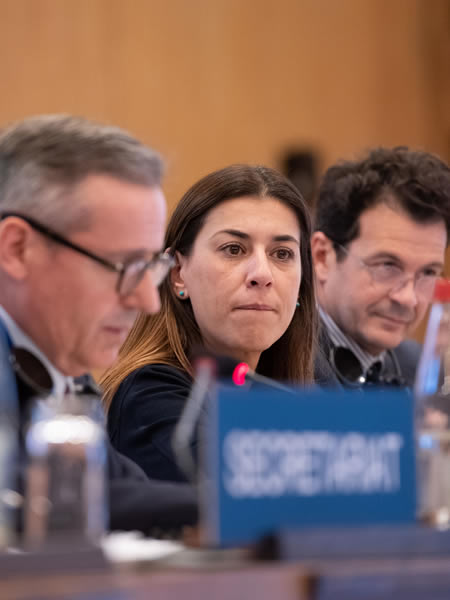« IPI 2020 World Congress welcomes Powerful Partners — The New York Times, The Washington Post, Reuters, and The Associated Press (AP), among others. | Main | UN Secretary-General highlights UNESCO’s Global Leadership in Education at the Organization’s 40th General Conference. »
November 10, 2019
UNESCO General Conference to examine the draft of the Global Convention on the Recognition of Higher Education Qualifications.


Photo: UNESCO Headquarters, Paris, France. Session of the Executive Board. October 16-17, 2019. Image Credit: UNESCO/C. Bailleul.
Paris, France, November 9, 2019 — In November 2019, UNESCO’s General Conference will examine for adoption the draft text of the Global Convention on the Recognition of Higher Education Qualifications. Once approved, the Global Convention will be the first legally binding United Nations treaty on higher education.
The Global Convention, a binding agreement, will join the ranks of other UNESCO conventions, such as the cultural conventions and the Convention against doping in sport.
The Convention will be the first of its kind in the UN on higher education with a global scope. It will complement the five UNESCO regional conventions on the recognition of higher education qualifications.
Built on the existing regional conventions, the Global Convention will create a framework for fair, transparent, and non-discriminatory recognition of higher education qualifications. The originality of the Convention is that it opens for inter-regional academic mobility, and puts into place universal principles for improving recognition practices.
Under certain conditions, the Convention will be open for countries, which wish to be committed to its text.
Today, more than 4 million students study outside their home country. By 2020 around 8 million students will be studying abroad. The Global Convention on Higher Education Qualifications is designed to facilitate academic mobility between regions. It will mainly benefit people who are seeking recognition of their qualifications in another area than their home region for either accessing higher education or continuing their studies.
For example, it will become easier for a student to have his/her high school diplomas recognized in another region to pursue his/her studies there. It will also facilitate a student who wants to complete a degree in another country based on education that he/she had started elsewhere.
The Global Convention on Higher Education Qualifications will also provide platforms for national authorities to collaborate across borders and regions to develop better tools and practices for the recognition of higher education qualifications.
UNESCO serves as a global platform for discussion on the recognition of higher education qualifications and the promotion of academic mobility. Being the only UN agency with a mandate in higher education, the new Convention is part of UNESCO’s technical support to review more top education strategies and policies in countries that decided to be committed to its text. This support aims to improve equitable access to quality higher education and enhance mobility and accountability.
UNESCO will be the secretariat of the mechanism to be set to ensure and monitor the implementation of the Convention’s text. This implementation mechanism body will meet every two years. It will provide guidance (recommendations, guidelines, and share good practices) to the countries committed to the Convention.
The Global Convention on Higher Education Qualifications will be a reliable instrument to prevent brain drain since it would facilitate governments to put in place mechanisms for recognizing degrees obtained abroad.
The Convention will also help migrants to access higher education in their new home countries as it obliges to put in place mechanisms to facilitate the recognition of refugees’ qualifications, even for those who cannot provide any documentary evidence of their skills.
The idea of a Global Convention on Higher Education Qualifications has been on UNESCO’s agenda for a long time. The formal process started in 2011 after a feasibility study had underlined the urgent need for such a convention to respond to the need for improved recognition of foreign qualifications worldwide. For this purpose, UNESCO established a drafting committee in 2016 consisting of experts from all regions that finalized a preliminary draft in June 2017.
UNESCO presented the draft for discussion at two intergovernmental meetings that took place in December 2018 and March 2019.
At the March meeting, more than 260 technical and legal experts from around 150 Member States approved the plan. Now the draft will be submitted for adoption at the 40th Session of the UNESCO General Conference in November 2019.
|GlobalGiants.Com|
Dear students,
— UNESCO (@UNESCO) November 25, 2019
🚨HISTORY WAS MADE TODAY🚨
The first ever Global Convention on #HigherEducation was adopted at #unescoGC! This will create a system of recognition of higher education qualifications on a global scale, the first of its kind.
📚https://t.co/5rOtm71MR9 pic.twitter.com/s4yizOisEz







Edited & Posted by the Editor | 3:58 AM | Link to this Post







